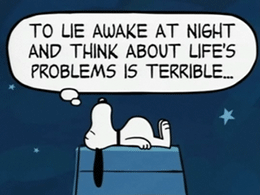
Test yourself on these common sayings about sleep.
1. Sleep is time for the body in general and the brain specifically to shut down for rest.
True or False?
Mostly False. Sleep is an active process involving specific cues for its regulation. Although there are some modest decreases in metabolic rate, there is no evidence that any major organ or regulatory system in the body shuts down during sleep. Some brain activity, including delta waves ,increases dramatically. Also, the endocrine system increases secretion of certain hormones during sleep, such as growth hormone and prolactin. In REM sleep, many parts of the brain are as active as at any time when awake.
2. Getting just one hour less sleep per night than needed will not affect daytime functioning.
True or False?
False. When daily sleep time is less than an individual needs, a “sleep debt” develops. Even relatively modest daily reductions in sleep time (for example, one hour) can accumulate across days to cause a sleep debt. If the debt becomes too great, it can lead to problem sleepiness. Although the individual may not realize his or her sleepiness, the sleep debt can have powerful effects on daytime performance, thinking, and mood.
3. The body adjusts quickly to different sleep schedules.
True or False?
False. The biological clock that times and controls a person’s sleep/wake cycle will attempt to function according to a normal day/night schedule even when that person tries to change it. Those who work night shifts naturally feel sleepy when night-time comes. A similar feeling that occurs during travel is known as jet lag. This conflict, set up by trying to be active during the brain’s biological night-time, leads to a decrease in cognitive and motor skills. The biological clock can be reset, but only by appropriately timed cues and even then, by one to two hours per day at best. E.g. sleeping in a dark, quiet room, getting exposure to bright light at the right time, and altering eating and exercise patterns. Because humans function best when they sleep at night and act in the daytime, the task for a person who must be active at night is to retrain the biological clock (by light cues).
4. People need less sleep as they grow older.
True or False?
False. Older people don’t need less sleep, but they often get less sleep. That’s because the ability to sleep for long periods of time and to get into the deep, restful stages of sleep decreases with age. Many older people have more fragile sleep and are more easily disturbed by light, noise, and pain than when younger. They are also more likely to have medical conditions that contribute to sleep problems.
5. A “good night’s sleep” can cure problems with excessive daytime sleepiness.
True or False?
Depends upon the diagnosis. Excessive daytime sleepiness can be associated with a sleep disorder or other medical condition. Sleep disorders, including sleep apnea (that is, absence of breathing during sleep), insomnia, and narcolepsy, may require behavioural, pharmacological, or even surgical intervention to relieve the symptoms. Extra sleep may not eliminate daytime sleepiness caused by such disorders.
Don’t listen to ‘old wives’ tales’ about sleep.
It’s too important to your memory and general health to rely on myths of the past.
Lots of research has gone into sleep habits and the effects poor sleep can have on general health so DO something about it if you have sleep issues.
Read more: Sleep deprived? How to help, or Tired of not sleeping? NIH Guide to Sleep, Why can’t I sleep?





